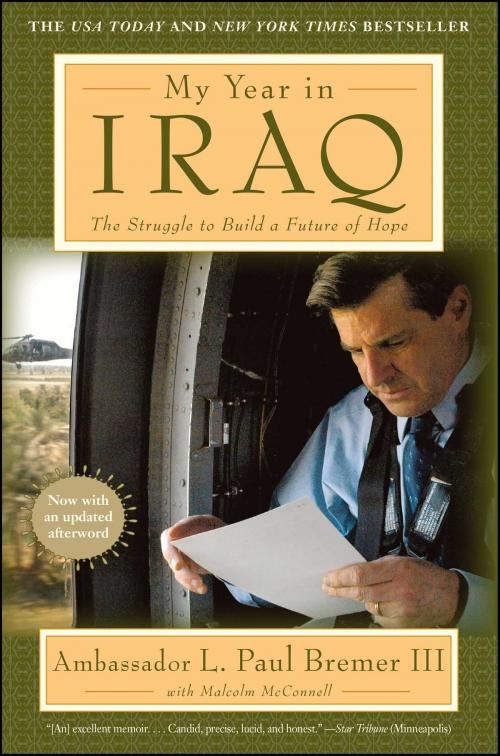My Year in Iraq
The Struggle to Build a Future of Hope
Nonfiction, History, Americas, United States, Biography & Memoir| Author: | L. Paul Bremer III | ISBN: | 9780743289078 |
| Publisher: | Simon & Schuster | Publication: | January 9, 2006 |
| Imprint: | Simon & Schuster | Language: | English |
| Author: | L. Paul Bremer III |
| ISBN: | 9780743289078 |
| Publisher: | Simon & Schuster |
| Publication: | January 9, 2006 |
| Imprint: | Simon & Schuster |
| Language: | English |
"BAGHDAD WAS BURNING."
With these words, Ambassador L. Paul "Jerry" Bremer begins his gripping memoir of fourteen danger-filled months as America's proconsul in Iraq. My Year in Iraq is the only senior insider's perspective on the crucial period following the collapse of Saddam Hussein's regime. In vivid, dramatic detail, Bremer reveals the previously hidden struggles among Iraqi politicians and America's leaders, taking us from the ancient lanes in the holy city of Najaf to the White House Situation Room and the Pentagon E-Ring.
His memoir carries the reader behind closed doors in Baghdad during hammer-and-tongs negotiations with emerging Iraqi leaders as they struggle to forge the democratic institutions vital to Iraq's future of hope. He describes his private meetings with President Bush and his admiration for the president's firm wartime leadership. And we witness heated sessions among members of America's National Security Council -- George Bush, Dick Cheney, Colin Powell, Donald Rumsfeld, and Condoleezza Rice -- as Bremer labors to realize the vision he and President Bush share of a free and democratic New Iraq. He admires the selfless and courageous work of thousands of American servicemen and -women and civilians in Iraq.
The flames Bremer describes on arriving in Baghdad were from fires started by looters. One of his first acts was to request an additional 4,000 Military Police to help restore order in the streets. For most of the next year, as the insurgency spread, Bremer resisted efforts by generals and senior Defense Department civilians to reduce American troop strength prematurely, replacing our forces with ill-trained, poorly led Iraqi police and soldiers. And he lays to rest the myth that the Coalition disbanded Saddam's army, a force comprised of Shiite draftees who had deserted and refused to serve under their former Sunni officers. Bremer also describes his frustration with intelligence operations that concentrated on the search for weapons of mass destruction while the insurgency gathered strength.
Bremer faced daunting problems working with Iraq's traumatized and divided population to find a path to a responsible and representative government. The Shia Arabs, the country's long-repressed majority, deeply distrusted the Sunni Arab minority who had held power for centuries and had controlled the detested Baath Party. Iraq's non-Arab Kurds teetered on the brink of secession when Bremer arrived. He had to find Sunnis willing to participate in the new political order.
Some in the U.S. government pushed for what Bremer would come to call a cut-and-run policy that would have quickly delivered governance of Iraq to a handful of unrepresentative anti-Saddam exiles. Bremer vigorously resisted this ill-conceived course. He takes the reader inside marathon negotiations as he and his team shepherded Iraq's new leaders to write an interim constitution with guarantees for individual and minority rights unprecedented in the region.
My Year in Iraq is required reading for all those interested in the real story of how America responded to its gravest recent overseas crisis.
"BAGHDAD WAS BURNING."
With these words, Ambassador L. Paul "Jerry" Bremer begins his gripping memoir of fourteen danger-filled months as America's proconsul in Iraq. My Year in Iraq is the only senior insider's perspective on the crucial period following the collapse of Saddam Hussein's regime. In vivid, dramatic detail, Bremer reveals the previously hidden struggles among Iraqi politicians and America's leaders, taking us from the ancient lanes in the holy city of Najaf to the White House Situation Room and the Pentagon E-Ring.
His memoir carries the reader behind closed doors in Baghdad during hammer-and-tongs negotiations with emerging Iraqi leaders as they struggle to forge the democratic institutions vital to Iraq's future of hope. He describes his private meetings with President Bush and his admiration for the president's firm wartime leadership. And we witness heated sessions among members of America's National Security Council -- George Bush, Dick Cheney, Colin Powell, Donald Rumsfeld, and Condoleezza Rice -- as Bremer labors to realize the vision he and President Bush share of a free and democratic New Iraq. He admires the selfless and courageous work of thousands of American servicemen and -women and civilians in Iraq.
The flames Bremer describes on arriving in Baghdad were from fires started by looters. One of his first acts was to request an additional 4,000 Military Police to help restore order in the streets. For most of the next year, as the insurgency spread, Bremer resisted efforts by generals and senior Defense Department civilians to reduce American troop strength prematurely, replacing our forces with ill-trained, poorly led Iraqi police and soldiers. And he lays to rest the myth that the Coalition disbanded Saddam's army, a force comprised of Shiite draftees who had deserted and refused to serve under their former Sunni officers. Bremer also describes his frustration with intelligence operations that concentrated on the search for weapons of mass destruction while the insurgency gathered strength.
Bremer faced daunting problems working with Iraq's traumatized and divided population to find a path to a responsible and representative government. The Shia Arabs, the country's long-repressed majority, deeply distrusted the Sunni Arab minority who had held power for centuries and had controlled the detested Baath Party. Iraq's non-Arab Kurds teetered on the brink of secession when Bremer arrived. He had to find Sunnis willing to participate in the new political order.
Some in the U.S. government pushed for what Bremer would come to call a cut-and-run policy that would have quickly delivered governance of Iraq to a handful of unrepresentative anti-Saddam exiles. Bremer vigorously resisted this ill-conceived course. He takes the reader inside marathon negotiations as he and his team shepherded Iraq's new leaders to write an interim constitution with guarantees for individual and minority rights unprecedented in the region.
My Year in Iraq is required reading for all those interested in the real story of how America responded to its gravest recent overseas crisis.















